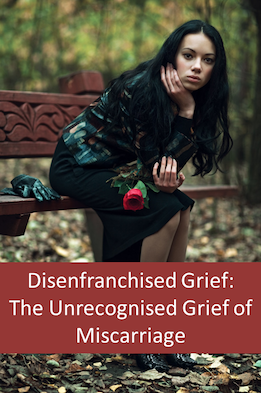Disenfranchised Grief: Unacknowledged Pain
Parents who experience pregnancy loss are often experiencing disenfranchised grief.
This is grief which has little social recognition or where the loss has been hidden from others. The grief essentially has no voice or is not acknowledged in society.
This is especially the case with pregnancy loss which is often seen as a form of ambiguous loss.
People in this situation can experience a more complicated grief process and more intense emotional reactions.
Disenfranchised Grief: Hidden Pain and Delayed Expression
Disenfranchised grief often results in poor or delayed emotional expression and the absence of mourning rituals. Disenfranchised grief may lay hidden for years, only to be triggered by later losses.
Wrong To Grieve A Pregnancy Loss?
Some women are uncomfortable about grieving for an early pregnancy loss because they have only known about the baby for a few days or weeks and have often never seen it.
These feelings are often supported by comments like “at least you weren’t very far along” and “you’re lucky you didn’t have a chance to get attached to it”, leaving us confused about how we should or shouldn’t feel.
Grieving A Pregnancy Loss is Natural
Every experience of pregnancy loss is unique and the way we each experience grief can also be unique.
What is consistent is that we all grieve and our grief tends to flow in a pattern.
There Is No “Right” or “Wrong” Way to Grieve
The length of time we spend in grief and at each stage of grief differs. This is very personal, and there is absolutely no right or wrong way to grieve.
Grief and Grieving Are Essential to Healing
Grief is an essential part of our healing so grieve to the level that you need to.
Four Discoveries About Bereavement
Bereavement Takes Time – More Time Than People Think
In 1988, Osterweis and Townsend conducted specific research on adult grief and discovered a number of interesting things.
First, they found that the bereavement process is long, much longer than most people consider.
In fact, some people find that the second year of grief is more difficult than the first.
For many people, the grief process may take several years.
Bereavement Does Not Follow A Single Pattern: Time and Issues Vary
Second, they found that the adult bereavement process does not necessarily progress in an orderly fashion and that the individual variation in grief is substantial.
People vary in terms of how quickly they are able to recover from both the loss and the issues that are a part of their grief.
They also have different resources to draw on and this affects the speed of resolution.
There Is No “Normal” Bereavement
Osterweis and Townsend also found that many emotions and behaviours that might be judged abnormal under other circumstances are common following loss.
They concluded that it is inappropriate to judge the bereaved by ‘normal’ standards, as their life is not normal after a loss.
Anniversary and Family Celebrations As Triggers
Finally, Osterweis and Townsend noted that reactions are common on the anniversary of the loss and during family celebrations like Christmas.6[1]
Take care until next time
Helen.



